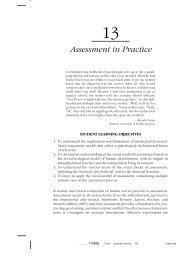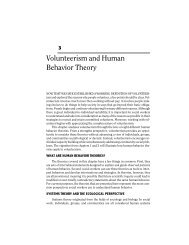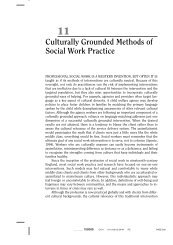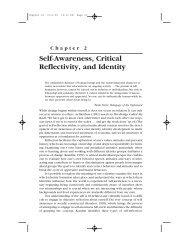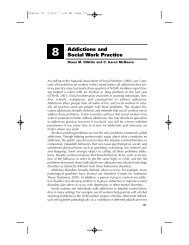Social Work's Historical Relationship to Volunteerism - Lyceum Books
Social Work's Historical Relationship to Volunteerism - Lyceum Books
Social Work's Historical Relationship to Volunteerism - Lyceum Books
You also want an ePaper? Increase the reach of your titles
YUMPU automatically turns print PDFs into web optimized ePapers that Google loves.
Chapter 5 <strong>Social</strong> Work’s <strong>His<strong>to</strong>rical</strong> <strong>Relationship</strong> <strong>to</strong> <strong>Volunteerism</strong> 69<br />
cial work was not a profession. What happened thereafter, and still continues <strong>to</strong> occur,<br />
was an all-out attempt <strong>to</strong> demonstrate <strong>to</strong> colleagues, clients, society, and most<br />
importantly ourselves that social work was and is a profession. And if social work<br />
was <strong>to</strong> be considered a profession, there would have <strong>to</strong> be separation between the<br />
field of social work and the efforts of volunteerism. <strong>Social</strong> work thus abandoned its<br />
roots in its quest for professional status.<br />
In the decades following Flexner’s presentation, the focus of social work was<br />
dominated by its search for a knowledge base and practice methods. In its search,<br />
social work became infatuated with psychiatry and Freudian psychology, which<br />
conveniently offered two advantages in terms of achieving professional status. First,<br />
the use of psychiatry and Freudian psychology allowed social work <strong>to</strong> claim adherence<br />
<strong>to</strong> a specific knowledge base that would satisfy the gap pointed out by Flexner.<br />
Within a few years of his presentation, several leading social workers began promoting<br />
their new knowledge base. Eventually psychiatric social work emerged as a<br />
distinct field of practice, and Freudian psychology (and the theories derived from<br />
Freudian psychology) emerged as the primary theory in most areas of practice.<br />
Second, psychiatry and Freudian psychology offered social work the opportunity<br />
<strong>to</strong> associate its practice methods with the medical model of practice, thus elevating<br />
the status of social workers <strong>to</strong> that of trained experts providing treatment.<br />
Instead of emphasizing the larger environmental causes of poverty and other community<br />
problems, the scope of social work practice narrowed <strong>to</strong> more definable<br />
ends—providing services and treatment <strong>to</strong> enhance the well-being of individuals<br />
(Hamil<strong>to</strong>n, 1956; Perlman, 1949). Under the medical model, social workers essentially<br />
study the problems of their clients, diagnose the problems (or strengths, in the<br />
current perspective), and prescribe action steps <strong>to</strong> produce the desired outcome.<br />
Whether working in child and family services, foster care, mental health, substance<br />
abuse, or geron<strong>to</strong>logy, the social worker <strong>to</strong>day commonly equates practice with<br />
working directly with individual clients <strong>to</strong> enhance their well-being (Specht &<br />
Courtney, 1994).<br />
The prominence of the medical model remains evident in the NASW Code of<br />
Ethics. The very first sentence of section 1.01 of the code states, “<strong>Social</strong> workers’<br />
primary responsibility is <strong>to</strong> promote the well-being of clients” (National Association<br />
of <strong>Social</strong> Workers, 1999, p. 7). Furthermore, as is evident from the list of ethical<br />
standards in section 1, of the term “clients” is narrowly defined as individuals receiving<br />
treatment or services from trained social workers.<br />
While the field’s use of psychiatry and Freudian psychology helped <strong>to</strong> legitimize<br />
social work as a profession, Richmond’s and Addams’s belief that social workers<br />
could never completely stand in as the social servants of the community was forgotten.<br />
On one hand, the profession blossomed during the twentieth century as<br />
social work secured its place as the primary profession in the development and provision<br />
of social services (Council on <strong>Social</strong> Work Education, 2001). On the other<br />
hand, several scholars suggest that social work has tended <strong>to</strong> focus primarily on






